Transition-Metal Complexes for Sustainable Polymer Synthesis and Intracellular Catalysis
Every year, the College of Natural Sciences and Mathematics recognizes one of its assistant professors with the Junior Research Faculty Award for Excellence in Research. This award recognizes exceptional contributions to research.

The 2018 award was given to Loi Do, assistant professor of chemistry. As one recommender noted, in Do’s time at the University of Houston, he has exhibited “stellar research achievements, excellent funding record, and an extraordinary dedication to student mentoring.”
For this honor, Do was presented with a plaque at the UH Commencement for the College of Natural Sciences and Mathematics, and he will receive a cash prize of $5,000.
To be eligible for this award, junior faculty must be nominated by their department. In support of their nomination, three researchers, who are respected within the field but unaffiliated with UH, write letters of support, along with the department chair.
Do, who joined the Department of Chemistry in 2013, works in the area of inorganic, organometallic and bioinorganic chemistry. His group’s diverse research focuses on transition-metal catalysts for the synthesis of polymers as well as for the creation of novel metallotherapeutics, which are metal-containing drug compounds. First row transition metal compounds offer a cheaper, more sustainable alternative to precious metal compounds.
“In one area of our work, we are trying to develop new transition-based metal catalysts, in order to engineer new processes to create functional polymers,” said Do, whose research was recently recognized with a prestigious NSF CAREER Award.
One recommender noted that Do exhibits “great rigor, insight and creativity,” while another recommender cited Do’s “original and innovative ideas.”
As one recommender wrote, Do’s research is “breaking new ground at the intersection of chemical catalysis and the life sciences,” while also noting that it is “unusual for classically trained synthetic chemists to work in chemical biology, but Loi Do and his team have been able to acquire the wide range of skills needed to succeed in their highly interdisciplinary research program.”
- Rachel Fairbank, College of Natural Sciences and Mathematics